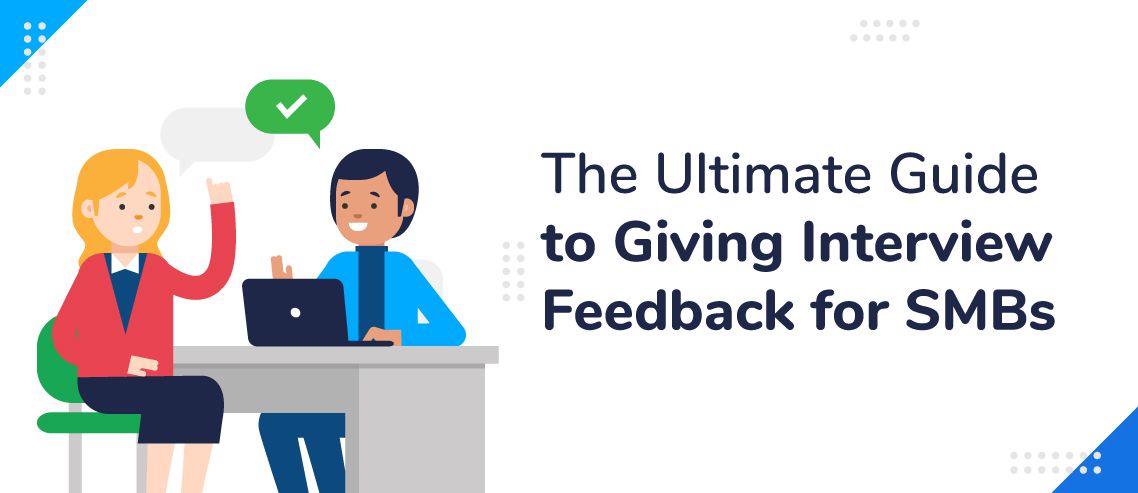The Ultimate Guide to Giving Interview Feedback for SMBs

If you’re giving interview feedback, then chances are the candidate didn’t get the role. It’s naturally a disappointing conversation for them, and one they will likely want to end as soon as possible.
However, the way you provide feedback can have a lasting effect on not only the candidate but the company’s future hiring opportunities. Conducting a good interview boils down to preparation.
When you take the time to review their cover letter, resume, and come up with specific questions, the conversation flows better, and you ultimately create a deeper connection. If you pair that with strong questions and good note-taking, you’ll have everything you need to not only make your decision, but provide feedback to all candidates.
Here’s the ultimate guide to giving interview feedback for SMBs:
Curate a Repeatable Experience
Giving the best possible interview feedback starts before the interview even begins. All interviews are unique experiences, but the interviewer is in a position to make them feel more uniform.
Interviewing under the same conditions makes it easier to compare all your candidates and provide thoughtful feedback with less bias. Some common ways you can do so include:
- Ensuring all candidates use the same communication method such as in-person or videoconferencing
- Providing a similar rundown of what you’re looking for in a candidate
- Asking the best interview questions but keeping them uniform across all candidates
- Making the same offers to do working interviews or ask frontline employees questions
Even interviewing at consistent times of the day can stifle any bias that comes with lower patience, willpower, and blood sugar levels that typically zap our energy in the late afternoons.
Soften the Blow With Praise
Whether you’re interviewing a handful of candidates or dozens, it’s highly advisable to take notes during the interview. Jot down what they did well and anything that felt “off.” If there were several great candidates, this will also help you and your hiring team make a final decision.
Grab direct quotes where possible to provide examples and make a conscious effort not to put words in their mouth when taking notes. You can prompt them or ask a clarifying question, but it’s better to get their unfiltered thoughts.
When it’s time to give feedback, try to lead the conversation with what they did well. This will help bring their guard down and show that you genuinely care about seeing them succeed. Hopefully, the things they did well will sink in, and they’ll repeat them in subsequent interviews.
Compliment them on their thoughtful answers or on their attention-getting cover letter. Make it known that you appreciate the way they carry themselves with confidence. Again, a little praise up front can soften any blows to their ego and make them more receptive to the opportunistic feedback you’re about to give them.

Follow Through With Opportunities
Referring back to your notes will often lead you to at least a handful of moments they could have handled better.
If they didn’t dress up, were late, or didn’t use a professional Zoom background, then call that out. Sometimes the littlest things can separate a candidate from the competition. Especially when you have a pool full of highly qualified candidates.
While you’re at it, make sure they’re aware of any communication errors. If they say “uh” or “um” a lot or use other crutch words, then let them know. If they tend to repeat themselves or ramble through answers before finally making a point, they’d likely benefit from knowing that as well.
If they didn’t exude confidence or display professionalism, that should be of note too. Sometimes, it’s not what they say, but how they say it.
Getting a list full of things you got wrong or could’ve done better doesn’t feel great. To bring the point home, try offering up advice on how they could improve in those areas. Detailed examples make a difference here. Advise them to practice in front of a mirror or to remove words like “probably” or “perhaps” to sound more confident. You get the idea.
Lastly, if you left room in the interview for them to ask questions and they were generic, then tell them so. Tell them what would have impressed you instead.
End With General Career Advice
If you’re in a position to hire people, then you probably have some iron-clad stories and tips from your tenure that are gold to potential candidates. Share them!
Tell them what you’re looking for in a candidate or what makes interviewees stand out. Tell them why you selected the person you did for the role. Or tell them how you’ve advanced your career. Be as specific as possible and tell them what worked and what didn’t. Sometimes candidates can learn just as much from your failures as your successes.
Again, the goal isn’t to make them feel bad about their interview performance but to inspire them to try again and to leave the interview experience stronger and ready to tackle the next one. If you ask the right questions, then you’ll get answers that make giving feedback easier.
Wrapping Up
Ultimately, make your best effort to remain humble and make sure they walk away feeling as though they learned something. And remember that sometimes, it just comes down to whether they were the right fit – their interview style and skills may work perfectly for another company, another role, or another interviewer. It’s up to them to deduce what advice is relevant to them and find patterns.
Finally, if they did well, then encourage them to apply again in the future or tell them you’ll personally reach out when another opportunity arises. Do that enough times, and you’ll build an impressive pipeline of potential candidates you can call on when you need to fill a role quickly.
What’s your best advice for giving interview feedback? Tell us in the comments below:
JD enjoys teaching people how to use ZoomShift to save time spent on scheduling. He’s curious, likes learning new things everyday and playing the guitar (although it’s a work in progress).



